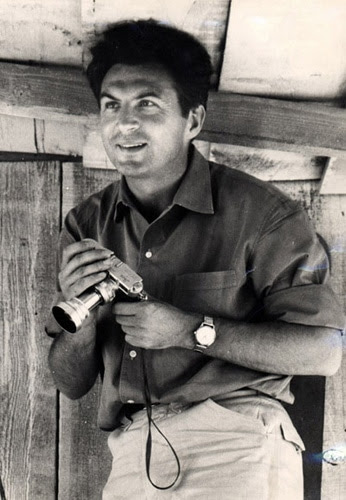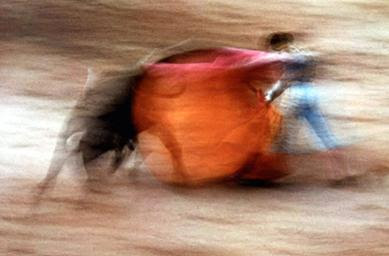By Heinz Richter
Ernst Haas (1921–1986) is considered one of the best, most celebrated and influential photographers of the 20th century and considered one of the pioneers of color photography. Haas was born in Vienna in 1921. He did not become a photographer until after the war. His early work showed Austrian prisoners of war returning home. This brought him to the attention of LIFE magazine. Initially he declined a job offer as staff photographer in order to keep his independence. But an invitation from Robert Capa changed his mind. Soon after, Haas joined Magnum in 1949. There he developed a close associations with Capa, Henri Cartier-Bresson, and Werner Bishof.
In 1951 Haas moved to the United States where he began experimenting with Kodachrome color film. He soon he became the premier color photographer of the 1950s. In 1953 LIFE magazine published his groundbreaking 24-page color photo essay on New York City. This was the first time such a large color photo feature was published by LIFE. In 1962 a retrospective of his work was the first color photography exhibition held at New York’s Museum of Modern Art.

Ernst Haas using a Leica
Photo: Glenn Beier
Throughout his career, Haas traveled extensively, photographing for LIFE, Vogue, and Look, to name a few of the many influential publications that featured his work He created four books during his lifetime: The Creation (1971), In America (1975), In Germany (1976), and Himalayan Pilgrimage (1978).
Ernst Haas continued to work until 1986, the year of his death. He has been the subject of numerous museum exhibitions and publications such as Ernst Haas, Color Photography (1989), Ernst Haas in Black and White (1992), and Color Correction (2011). The Ernst Haas Studio, located in New York, continues to manage Haas's legacy, aiding researchers and overseeing all projects related to his work.
It would be wrong to claim that Ernst Haas used only Leica equipment, but Leicas have definitely been an integral part of his professional life, and many of his famous photographs have been taken with Leica cameras.
When Ernst Haas began photographing in color, he soon created an entirely new approach to color photography by purposely using rather slow shutter speeds to blur the image. However, as he explained, this was not left to chance. He used the colors of the scene, and by deliberately blurring the image, he was actually able to create additional colors through the blurred overlap of the various subjects in the scene.. This approach was made especially famous by his photographs of bullfights in Spain.



Obviously, Haas applied his blurring technique to other subjects as well

Photograph from his book "The Creation"
The above photograph was later used by Kodak for the Kodak Colorama at Grand Central Station in New York City in 1977. The original picture was taken with a Leicaflex SL and a 50mm Summicron-R lens on Kodachrome 25. The finished Colorama consisted of 20 vertical panels of 3 feet width and 18 feet height for a total size of 18 x 60 feet This was the first time a 35mm picture had been used for this project. It presents a 508 times enlargement to achieve the width of the image. It was a definite testament of the quality of the film and that of the Leica camera and lens.

From the book "In America"
Ernst Hass quite often tried to take photographs of ordinary subjects and to present them as an apparently abstract photograph, although, as he explained, that is a contradiction of terms. A photograph cannot possibly be abstract because a camera can only record actual subject matter.

"The Cross"

"Snow Lovers"

"Holy Underwear"

"Torn Poster"
Ernst Haas had an uncanny ability to find ordinary subjects and by seeing beyond the obvious, was able to create extraordinary photographs.
The first time I met Ernst Haas was at a meeting of the Leica Historical Society of America. He had been invited as the main speaker for the event. One thing that struck me immediately was that here was a person who gained international fame with his wonderful color photography and his masterful use of colors, yet he was clothed all in black, black pants, black shirt, black jacket, black tie. I saw him talking in German to Walter Heun, the former director of the Leica School. That in itself was quite an interesting conversation. I knew Walter Heun and, upon noticing me, he introduced me to Ernst Haas. I was fortunate to meet him again on a couple of other occasions.
There have been many excellent and important photographers, past and present. Ernst Haas was without question one of the greatest of them all.
For other articles on this blog please click on Blog Archive in the column to the rightTo comment or to read comments please scroll past the ads below.All ads present items of interest to Leica owners._______________________________________________________________________
The next Tamarkin Camera auction isNovember 14, 2020Buy vintage Leica cameras fromAmerica's premier Leica specialisthttp://www.tamarkin.com/leicagallery/upcoming-show
Click on image to enlarOrder: info@gmpphoto.comPlease make payment via PayPal to GMP PhotographyClick on image to enlargeOrder: info@gmpphoto.comPlease make payment via PayPal to GMP PhotographyClick on image to enlargeOrder: info@gmpphoto.comPlease make payment via PayPal to GMP Photography













No comments:
Post a Comment